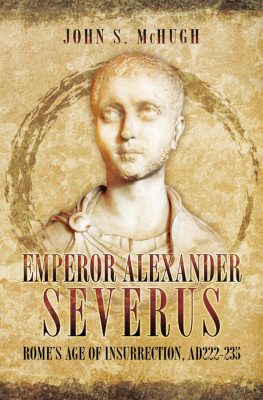Sandra Bingham is a teaching fellow at the University of Edinburgh. Her publications include articles on aspects of the praetorian guard and on the Severans. Other interests include the rediscovery and reception of Carthage, Roman imperial women and the concept of imperial retreats.
Sandra Binghams new book is an attractively written assessment of a military force which was central to political events at Rome, providing close protection for the emperor and his family, and accompanying him in his campaigns on the frontiers. The authors compelling narrative brings before us the officers and soldiers on duty at the imperial palace and in their fortified encampment on the outskirts of the city. This is a most welcome evocation of the Praetorians and their world that will appeal to specialists and general readers alike.
Lawrence Keppie, Emeritus Professor of Roman History and Archaeology, University of Glasgow
Sandra Binghams book is a much-needed and valuable history of the praetorian guard from its origins to its disbandment by the emperor Constantine the Great in AD 312. It covers the history, organization and duties of the guard with full notes and bibliography. There is no full-length treatment of the praetorian guard in English, so this book will be greatly appreciated by classical historians, Roman military historians and students of Roman history. Clear and concise in style, supported by ancient and current secondary sources, Binghams study is balanced in its treatment of an often partisan subject.
Sara Elise Phang, author of Roman Military Service: Ideologies of Discipline in the Late Republic and Early Principate
Sandra Bingham explores the idea that the praetorians were much more than the emperors bodyguard. They had a role in maintaining state security, policing large gatherings, fire-fighting, arresting and sometimes executing suspects, and occasionally even spying for the emperor. And by the second century AD they had developed a battlefield role since part of the guard usually accompanied the emperor on campaign. As the praetorians were stationed in Rome close to the emperor and under the control of his right-hand man, the praetorian prefect, they were inevitably drawn into the political intrigue and power struggles of the imperial court. Binghams fast-paced though carefully constructed narrative, backed up by sound analysis of crucial issues, expertly conveys the reader through this blood-thirsty and exciting tale, which highlights important issues in the wider history of the Roman world. Detailed notes make the book a valuable tool for students and scholars, while general readers will welcome its crisp and clear style and eye for intriguing details of life in the guard.
Brian Campbell, Professor of Roman History, Queens University, Belfast
Sandra Binghams The Praetorian Guard considers how the Roman elite military unit shaped Roman history, protecting, counseling, removing and replacing various emperors. Bingham neatly explains the history of the Guard, detailing the forerunners of the unit in republican Rome, such as the private cohorts of Sulla, Marius, Catiline, and even Cicero himself. She considers the status of the guard in Roman society, where and how it was physically stationed in the city, as well as the units internal organization, offering also salient comments about the guard as a fighting unit. Binghams copious notes do not slow down the narrative but allow the studious reader to pursue sundry points in fuller detail. All in all, a valuable contribution to Roman history generally and specifically to Roman imperial rule, the household of the emperor, and the person of the emperor himself.
R. Alden Smith, Professor of Classics, Baylor University
Published in 2013 by I.B.Tauris & Co Ltd
6 Salem Road, London W2 4BU
175 Fifth Avenue, New York NY 10010
www.ibtauris.com
Copyright 2013 Sandra Bingham
The right of Sandra Bingham to be identified as the author of this work has been asserted by her in accordance with the Copyright, Designs and Patent Act 1988.
All rights reserved. Except for brief quotations in a review, this book, or any part thereof, may not be reproduced, stored in or introduced into a retrieval system, or transmitted, in any form or by any means, electronic, mechanical, photocopying, recording or otherwise, without the prior written permission of the publisher.
ISBN: 978 1 84511 884 6
eISBN: 978 0 85773 286 6
A full CIP record for this book is available from the British Library
This book is dedicated to the memory of my parents, Alfred (19141994) and Adelaide (19232012), whose love of learning led me to this path.
CONTENTS
PLATES
PREFACE
This book is based partly on my research on the guard under the Julio-Claudians (University of British Columbia, 1997) and partly on research conducted since then, which now has led to a course on the praetorians that I teach at the University of Edinburgh. Many people have supported me in the endeavour to see this project to fruition. I would like to single out in particular Tom Harrison, Greg Woolf, Jill Harries, Jon Hesk, Roger Rees, Roy Pinkerton, Keith Rutter, Allan Hood, Douglas Cairns, Ulrike Roth and Lucy Grig. An extra special thank you goes to Lloyd Llewellyn-Jones for the drawings but especially for the laughs when I most needed them. I am grateful also to the Canadian contingent, Ann Dusing, Charmaine Gorrie, Arden Williams, Kathryn Simonsen and Eve MacDonald for their unflagging conviction that I would eventually get this done. Thanks also to Kate Collingridge, Jill Shaw and Elaine Hutchison for putting up with me over the years. I am grateful as well to the reader for his insightful and very helpful comments. And finally to the students who took the course on the guard and learned to question everything, I hope you find at least some of the answers here.
The greatest debt is owed to my husband, Stephen, who never lost trust even in the darkest times. Without him, the guard would be only a distant memory. Thanks are not enough.
INTRODUCTION
The praetorian guard was one of the most distinctive features of Roman imperial rule. An elite unit of soldiers, these men mainly were responsible for the safety of the Roman emperor and his family, and were well rewarded for their loyalty.
The genesis of the unit can be found in the republican period. In the early part of the first century BC, the praetorian cohort that had functioned as a bodyguard for commanders in the field began to change and to take on more administrative tasks. The civil wars that erupted shortly thereafter halted this progression, and the cohorts reverted to being primarily a military force. But when Augustus decided to institute an armed unit for his personal use, he brought together both aspects of the earlier republican guard, making his imperial praetorians function not only in a military but also in an administrative capacity. Throughout the Julio-Claudian period, reliance on these soldiers for tasks other than guarding the emperor and his family began to take shape, though this expanding role usually does not attract much notice in the sources. Even during the reign of Augustus, there had been a realization that having so many soldiers close to the capital meant they could be used in any number of situations requiring large numbers of trained personnel. The evolution of the praetorians into a unit that fought fires, provided security at the games and carried out political espionage can be explained by the practicality of making use of the troops in the city as part of the overall organization of civic administration. In fact, there would be few major changes in the unit until late in the second century AD, by which time the guard was firmly entrenched in the life of the principate, of the city and of the empire.










